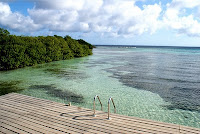This is a good example on how using social media can be an important tool for small Caribbean organisations in communicating, exposing themselves & reaching goals on an International playing field.
I had the opportunity to interview Desiree Eldering, who manages the FB fanpage for the Sanctuary. She shares the following with us:
TT: When was the Donkey Sanctuary established and how long have you been active on FaceBook?
DE: The donkey sanctuary was established on April 1997 and we have our FB page since July 2009 and started by an adoption parent as Aruban Donkey Sanctuary. This had its limits cause I couldn’t write as Donkey Sanctuary Aruba. So in February this year I made a new page which is Donkey Sanctuary Aruba. It took me a while before I was really a fan of the whole idea and now I try to post everyday something on the page.
TT: For a fanpage of a Non-Profit organisation on a small Island, you have a large number of followers, who are also very active. what in your opinion is the main reason for their engagement on your page?
DE: I think because I try to keep it is as positive as possible, don’t point a finger to what is wrong, or complain and react on what people write. I ask people specifically to place their pictures (when they have visited us) on our wall.
TT: What level of priority does the managing of your fanpage have in your daily to-do list?
DE: I check the page every day, but taking care of the donkey sanctuary itself has a bigger priority.
TT: Is there a big difference in the amount of interaction/visits of your fanpage in comparison to your website?
DE: Oh yes it is. Like you say there is interaction. We do appreciate our website as well though, cause that is more like giving information.
TT: Can you tell us of any special stories, or occurances that happened as a result of your fanpage?
DE: I learned a lot about donkeys in other places, donkeys in general on FB. We have donkeys been adopted because of the stories on FB, orders in our e-shop and I even designed a logo for Walk with donkeys on Crete…..
TT: In what way has your fanpage helped you achieve your goals as an organisation?
DE: It helps us to grow. We started 13 years ago with 10 donkeys and today we take care of 106 donkeys. People become aware of us and visit us. Not only because of FB but also our website, so Internet in general helps us to grow….
TT: As an organization operating in the Caribbean, targetting an international audience, what advice can you give to others regarding facebook fanpage management and developement?
DE: Try to post something positive (even try to give a positive twist on a negative event/situation) every day. Answer people who respond on your post. Do not complain or whine and ask questions, so you invite people to interact with you. Make it personal. People like it when they are remembered or appreciated.
Grotere kaart weergeven

